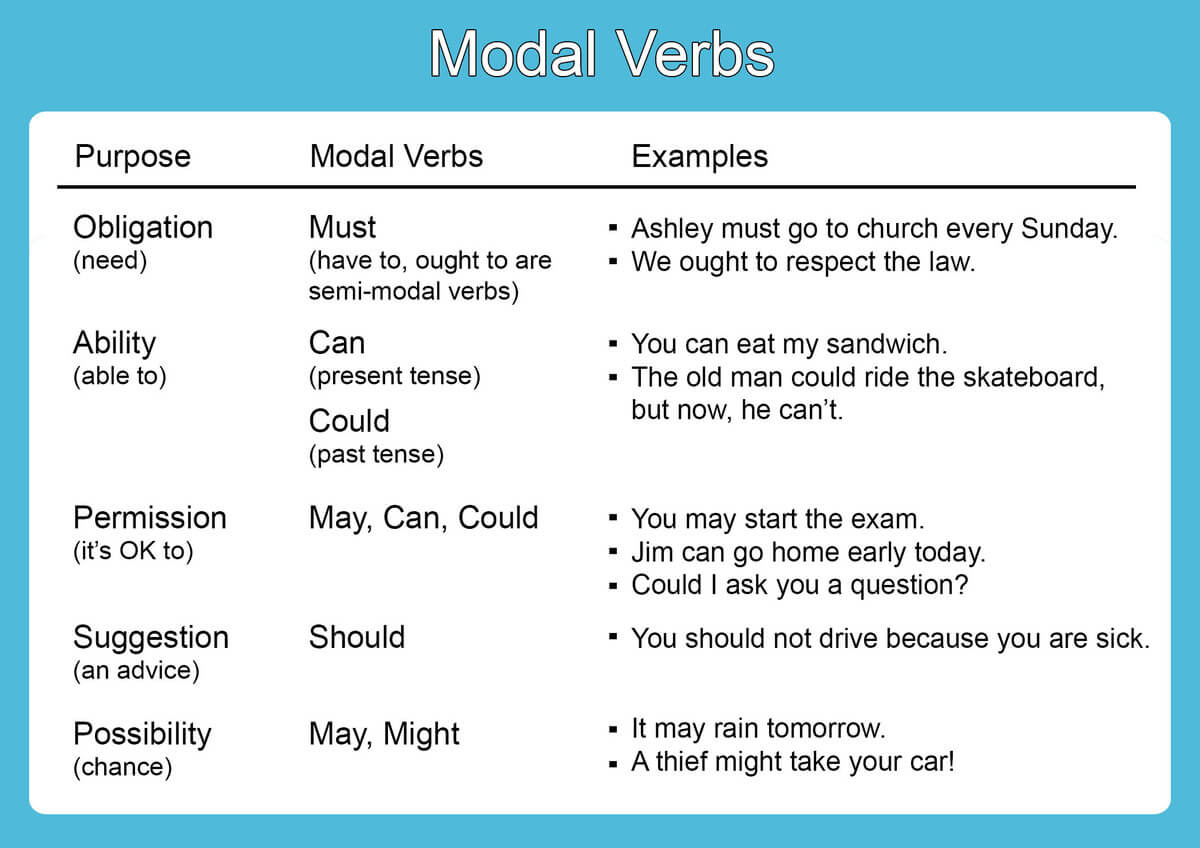Modal Verbs of Possibility, Permission, and Suggestion
- Modal verbs of possibility include may, might, and will, used to express how probable something is.
- Modal verbs of permission are can, could, and may, indicating if actions are allowed.
- The modal verb should is used for suggestions, advising on the best course of action.
Modal verbs are special helping verbs used to express obligation, ability, possibility, permission, and suggestion. Understanding these verbs will help you speak English more accurately and fluently.
Modal Verbs of Possibility: May, Might, Will
Modal verbs of possibility show us how likely something is to happen. The modal verbs of possibility are "may", "might", and "will". "May" and "might" are used to express possible events. "Will" is used to express prediction or certain events in the future.

Grammar Rule: Subject + modal verb + base form of the verb.
Examples:
-
She might go to the party tomorrow.
Subject ("She") + modal verb ("might") + base form ("go"). This shows it's possible but not certain she will attend.
-
It may rain tomorrow.
Subject ("It") + modal verb ("may") + base form ("rain"). This indicates there's a possibility of rain.
-
My brother will graduate high school in June.
Subject ("My brother") + modal verb ("will") + base form ("graduate"). It is certain that my brother will graduate in June.
Modal Verbs of Permission: Can, Could, May
When you want to ask for permission or say what's allowed, you can use "can", "could", or "may". These verbs are also useful for giving permission.
Note that "may" is more formal and "can" is more friendly or informal.
Grammar Rule: Subject + modal verb + base form of the verb.
Examples:
-
Can I leave early today?
"Can" is used here to ask for permission in a more informal context.
-
You may start the test now.
"May" gives permission, often seen as more formal or polite than "can".
Modal Verb of Suggestion: Should, Could
"Should" is the modal verb for making suggestions. It's used to advise or recommend something, suggesting a good idea or a beneficial action.
"Could" and "can" can also be used to make suggestions, though these are slightly less forceful than using "should."
Grammar Rule: Subject + modal verb + base form of the verb.
Examples:
-
We should see a doctor.
Subject ("We") + modal verb ("should") + base form ("see"). This sentence offers advice.
-
You could try the new restaurant. I hear it's very nice.
Subject ("You") + modal verb ("could") + base form ("try"). This is a suggestion for a future action.
Summary of Modal Verbs
| Obligation (need) | "Must", "Have to", "Ought to" |
| Ability (able to) | "Can", "Could", "Be able to" |
| Permission (it's okay to) | "May", "Can", "Could" |
| Suggestion (advice) | "Should", "Can", "Could" |
| Possibility (chance) | "May", "Might", "Will" |

Pratiquez ce sujet avec le AI English Tutor
AI English Tutor vous apprendra la grammaire et la pratiquera avec vous sous forme de conversation. De plus, plus de 100 questions pratiques sur ce sujet pour consolider votre compréhension.
Essayez ALULA gratuitement sur votre téléphone ou votre tablette








Avez-vous des questions sur cette leçon ? Posez-les dans la section des commentaires, ci-dessous.